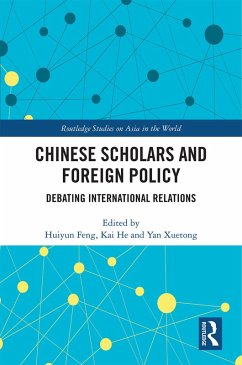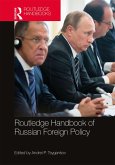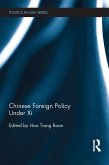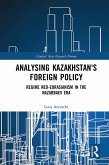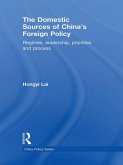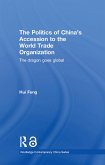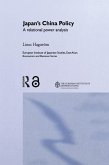Chinese Scholars and Foreign Policy (eBook, ePUB)
Debating International Relations
Redaktion: Feng, Huiyun; Xuetong, Yan; He, Kai
45,95 €
45,95 €
inkl. MwSt.
Sofort per Download lieferbar

23 °P sammeln
45,95 €
Als Download kaufen

45,95 €
inkl. MwSt.
Sofort per Download lieferbar

23 °P sammeln
Jetzt verschenken
Alle Infos zum eBook verschenken
45,95 €
inkl. MwSt.
Sofort per Download lieferbar
Alle Infos zum eBook verschenken

23 °P sammeln
Chinese Scholars and Foreign Policy (eBook, ePUB)
Debating International Relations
Redaktion: Feng, Huiyun; Xuetong, Yan; He, Kai
- Format: ePub
- Merkliste
- Auf die Merkliste
- Bewerten Bewerten
- Teilen
- Produkt teilen
- Produkterinnerung
- Produkterinnerung

Bitte loggen Sie sich zunächst in Ihr Kundenkonto ein oder registrieren Sie sich bei
bücher.de, um das eBook-Abo tolino select nutzen zu können.
Hier können Sie sich einloggen
Hier können Sie sich einloggen
Sie sind bereits eingeloggt. Klicken Sie auf 2. tolino select Abo, um fortzufahren.

Bitte loggen Sie sich zunächst in Ihr Kundenkonto ein oder registrieren Sie sich bei bücher.de, um das eBook-Abo tolino select nutzen zu können.
This book uses the first- and second-hand experiences of its contributors in scholarly International Relations debates in China to answer the questions: How does China see the rest of the world and to what extent do Chinese IR scholars influence Beijing's foreign policy and outlook?
- Geräte: eReader
- mit Kopierschutz
- eBook Hilfe
- Größe: 1.33MB
Andere Kunden interessierten sich auch für
![Routledge Handbook of Russian Foreign Policy (eBook, ePUB) Routledge Handbook of Russian Foreign Policy (eBook, ePUB)]() Routledge Handbook of Russian Foreign Policy (eBook, ePUB)50,95 €
Routledge Handbook of Russian Foreign Policy (eBook, ePUB)50,95 €![Chinese Foreign Policy Under Xi (eBook, ePUB) Chinese Foreign Policy Under Xi (eBook, ePUB)]() Chinese Foreign Policy Under Xi (eBook, ePUB)46,95 €
Chinese Foreign Policy Under Xi (eBook, ePUB)46,95 €![Analysing Kazakhstan's Foreign Policy (eBook, ePUB) Analysing Kazakhstan's Foreign Policy (eBook, ePUB)]() Luca AnceschiAnalysing Kazakhstan's Foreign Policy (eBook, ePUB)43,95 €
Luca AnceschiAnalysing Kazakhstan's Foreign Policy (eBook, ePUB)43,95 €![The Domestic Sources of China's Foreign Policy (eBook, ePUB) The Domestic Sources of China's Foreign Policy (eBook, ePUB)]() Lai HongyiThe Domestic Sources of China's Foreign Policy (eBook, ePUB)57,95 €
Lai HongyiThe Domestic Sources of China's Foreign Policy (eBook, ePUB)57,95 €![The Politics of China's Accession to the World Trade Organization (eBook, ePUB) The Politics of China's Accession to the World Trade Organization (eBook, ePUB)]() Hui FengThe Politics of China's Accession to the World Trade Organization (eBook, ePUB)0,00 €
Hui FengThe Politics of China's Accession to the World Trade Organization (eBook, ePUB)0,00 €![Japan's China Policy (eBook, ePUB) Japan's China Policy (eBook, ePUB)]() Linus HagströmJapan's China Policy (eBook, ePUB)0,00 €
Linus HagströmJapan's China Policy (eBook, ePUB)0,00 €![The Making of China's Foreign Policy in the 21st century (eBook, ePUB) The Making of China's Foreign Policy in the 21st century (eBook, ePUB)]() The Making of China's Foreign Policy in the 21st century (eBook, ePUB)47,95 €
The Making of China's Foreign Policy in the 21st century (eBook, ePUB)47,95 €-
-
-
This book uses the first- and second-hand experiences of its contributors in scholarly International Relations debates in China to answer the questions: How does China see the rest of the world and to what extent do Chinese IR scholars influence Beijing's foreign policy and outlook?
Dieser Download kann aus rechtlichen Gründen nur mit Rechnungsadresse in A, B, BG, CY, CZ, D, DK, EW, E, FIN, F, GR, HR, H, IRL, I, LT, L, LR, M, NL, PL, P, R, S, SLO, SK ausgeliefert werden.
Produktdetails
- Produktdetails
- Verlag: Taylor & Francis eBooks
- Seitenzahl: 226
- Erscheinungstermin: 4. Januar 2019
- Englisch
- ISBN-13: 9780429639067
- Artikelnr.: 54910010
- Verlag: Taylor & Francis eBooks
- Seitenzahl: 226
- Erscheinungstermin: 4. Januar 2019
- Englisch
- ISBN-13: 9780429639067
- Artikelnr.: 54910010
- Herstellerkennzeichnung Die Herstellerinformationen sind derzeit nicht verfügbar.
Huiyun Feng is senior lecturer in the School of Government and International Relations at Griffith University in Brisbane, Australia. She is a former Jennings Randolph Peace Scholar at the United States Institute of Peace. Her publications have appeared in the European Journal of International Relations, Security Studies, The Pacific Review, International Politics, Chinese Journal of International Politics, and Asian Perspective. She is the author of Chinese Strategic Culture and Foreign Policy Decision-Making: Confucianism, Leadership and War (Routledge, 2007) and the co-author of Prospect Theory and Foreign Policy Analysis in the Asia Pacific: Rational Leaders and Risky Behavior (Routledge, 2013). Kai He is professor of International Relations in the Griffith Asia Institute and Centre for Governance and Public Policy at Griffith University in Brisbane, Australia. He is currently an Australian Research Council (ARC) Future Fellow (2017-2020). He was a postdoctoral fellow in the Princeton-Harvard China and the World Program (2009-2010). He is the author of Institutional Balancing in the Asia Pacific: Economic Interdependence and China's Rise (Routledge, 2009), the co-author of Prospect Theory and Foreign Policy Analysis in the Asia Pacific: Rational Leaders and Risky Behavior (Routledge, 2013), and the author of China's Crisis Behavior: Political Survival and Foreign Policy (Cambridge, 2016). Yan Xuetong is the dean and distinguished professor in the Institute of International Relations at Tsinghua University in Beijing, China. He also serves as Secretary General of the World Peace Forum and the Editor-in-Chief of the Chinese Journal of International Politics. He is the Vice Chairman of both the China Association of International Relations Studies and the China Association of American Studies, plus serves as a member of the Consultation Committee in the Ministry of Commerce of the PRC. Professor Yan received his PhD in political science from the University of California, Berkeley in 1992. He is the author of many books and articles, including Ancient Chinese Thought, Modern Chinese Power (Princeton, 2011).
Acknowledgments
List of Contributors
List of Abbreviations
List of Figures
INTRODUCTION
Chapter 1. Why Do Chinese IR Scholars Matter? (Huiyun Feng and Kai He)
SECTION I - Key Concepts DebatesChapter 2. How Do Chinese Scholars View the
Evolution of International Structure? (ZHOU Fangyin)
Chapter 3. China Debates Soft Power: Implications for Chinese Foreign
Policy. (LI Mingjiang)
Chapter 4. The Debates among Chinese IR Scholars on China's National
Interests Strategy: 2010 2015. (CHEN Qi and LIU Lanyu)
Chapter 5. China Debates on the Non-Interference Principle. (CHEN Zheng)
SECTION II - Key Policies DebatesChapter 6. To Ally or Not to Ally?
Debating China's Non-Alliance Strategy in the 21st Century (LIU Ruonan and
LIU Feng)
Chapter 7. Preference Expression under Political Constraints: An Analysis
of Debates about China's Use of Force (YIN Jiwu)
Chapter 8. Chinese Scholars' Debate on Maritime Dispute Strategies (ZUO
Xiying)
Chapter 9. China's Debates on Economic Diplomacy (SONG Guoyou)
CONCLUSION
Chapter 10. Rethinking the Role of Scholars in Chinese Foreign Policy (Kai
He, Huiyun Feng, and YAN Xuetong)
Index
List of Contributors
List of Abbreviations
List of Figures
INTRODUCTION
Chapter 1. Why Do Chinese IR Scholars Matter? (Huiyun Feng and Kai He)
SECTION I - Key Concepts DebatesChapter 2. How Do Chinese Scholars View the
Evolution of International Structure? (ZHOU Fangyin)
Chapter 3. China Debates Soft Power: Implications for Chinese Foreign
Policy. (LI Mingjiang)
Chapter 4. The Debates among Chinese IR Scholars on China's National
Interests Strategy: 2010 2015. (CHEN Qi and LIU Lanyu)
Chapter 5. China Debates on the Non-Interference Principle. (CHEN Zheng)
SECTION II - Key Policies DebatesChapter 6. To Ally or Not to Ally?
Debating China's Non-Alliance Strategy in the 21st Century (LIU Ruonan and
LIU Feng)
Chapter 7. Preference Expression under Political Constraints: An Analysis
of Debates about China's Use of Force (YIN Jiwu)
Chapter 8. Chinese Scholars' Debate on Maritime Dispute Strategies (ZUO
Xiying)
Chapter 9. China's Debates on Economic Diplomacy (SONG Guoyou)
CONCLUSION
Chapter 10. Rethinking the Role of Scholars in Chinese Foreign Policy (Kai
He, Huiyun Feng, and YAN Xuetong)
Index
Acknowledgments
List of Contributors
List of Abbreviations
List of Figures
INTRODUCTION
Chapter 1. Why Do Chinese IR Scholars Matter? (Huiyun Feng and Kai He)
SECTION I - Key Concepts DebatesChapter 2. How Do Chinese Scholars View the
Evolution of International Structure? (ZHOU Fangyin)
Chapter 3. China Debates Soft Power: Implications for Chinese Foreign
Policy. (LI Mingjiang)
Chapter 4. The Debates among Chinese IR Scholars on China's National
Interests Strategy: 2010 2015. (CHEN Qi and LIU Lanyu)
Chapter 5. China Debates on the Non-Interference Principle. (CHEN Zheng)
SECTION II - Key Policies DebatesChapter 6. To Ally or Not to Ally?
Debating China's Non-Alliance Strategy in the 21st Century (LIU Ruonan and
LIU Feng)
Chapter 7. Preference Expression under Political Constraints: An Analysis
of Debates about China's Use of Force (YIN Jiwu)
Chapter 8. Chinese Scholars' Debate on Maritime Dispute Strategies (ZUO
Xiying)
Chapter 9. China's Debates on Economic Diplomacy (SONG Guoyou)
CONCLUSION
Chapter 10. Rethinking the Role of Scholars in Chinese Foreign Policy (Kai
He, Huiyun Feng, and YAN Xuetong)
Index
List of Contributors
List of Abbreviations
List of Figures
INTRODUCTION
Chapter 1. Why Do Chinese IR Scholars Matter? (Huiyun Feng and Kai He)
SECTION I - Key Concepts DebatesChapter 2. How Do Chinese Scholars View the
Evolution of International Structure? (ZHOU Fangyin)
Chapter 3. China Debates Soft Power: Implications for Chinese Foreign
Policy. (LI Mingjiang)
Chapter 4. The Debates among Chinese IR Scholars on China's National
Interests Strategy: 2010 2015. (CHEN Qi and LIU Lanyu)
Chapter 5. China Debates on the Non-Interference Principle. (CHEN Zheng)
SECTION II - Key Policies DebatesChapter 6. To Ally or Not to Ally?
Debating China's Non-Alliance Strategy in the 21st Century (LIU Ruonan and
LIU Feng)
Chapter 7. Preference Expression under Political Constraints: An Analysis
of Debates about China's Use of Force (YIN Jiwu)
Chapter 8. Chinese Scholars' Debate on Maritime Dispute Strategies (ZUO
Xiying)
Chapter 9. China's Debates on Economic Diplomacy (SONG Guoyou)
CONCLUSION
Chapter 10. Rethinking the Role of Scholars in Chinese Foreign Policy (Kai
He, Huiyun Feng, and YAN Xuetong)
Index
